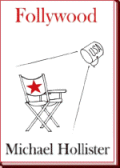Novelist & Critic
HOME PAGE
BIOGRAPHY
MODEL OF METAPHORS
DANEgerus
Patrick Garry, novelist
Apocalypse Now
The Best Years of Our Lives
The Big Chill
Billy Budd
The Bostonians
Casablanca
Citizen Kane
Close Encounters of the Third Kind
Coming Home
Daisy Miller
The Day of the Locust
Dr. Strangelove
Easy Rider
Fail-Safe
A Farewell to Arms
The Front
Gone with the Wind
Good Night, and Good Luck
The Graduate
The Grapes of Wrath
The Great Gatsby
Guilty by Suspicion
High Noon
Huckleberry Finn
Invasion of the Body Snatchers
Key Largo
The Majestic
Meet John Doe
Moby-Dick
The Old Man and the Sea
On the Waterfront
The Player
The Red Badge of Courage
Reds
The Scarlet Letter
The Shrike, based on Miss Lonelyhearts
2001: A Space Odyssey
The Sun Also Rises
Triumph of the Will
The Way We Were
Wise Blood
The Wizard of Oz
Woodstock
The World According to Garp
Peter Carafiol
Free Speech
Metaphor
archetype
Blacklist
Hollywood Novels
McCarthyism
Communist propaganda
Coming Home
One evening the actress Jane Fonda was shown in a group visiting Communist North Vietnam. She put on an enemy helmet, applauded their air defense gunners, seated herself in firing position on an aircraft gun and peered through the sights as though preparing to shoot down American pilots. Led around by North Vietnamese officials, she laughed and posed as if for a photo op promoting her next movie. They showed her eight American prisoners of war. They did not let her see the Hanoi Hilton, as prisoners mockingly called their internment camp. Though familiar with false fronts, Fonda proclaimed to the world press that the treatment of all our POWs was "humane and lenient." She accused Americans of torturing their prisoners. She went on Hanoi Radio and made propaganda broadcasts trying to dishearten American troops in combat, urging them to desert, like Axis Sally and Tokyo Rose during World War II. She called us murderers and compared our president to Hitler.
Veterans groups everywhere were incensed.
For years, Fonda had been preaching Communism on university campuses. She helped organize a group that set up coffeehouses near military bases where entertainment was antiwar and troops off duty were urged to desert. She was married to a French movie director for awhile and she subverted the American military using the methods of French Communists, whose subversion of the French military led to their defeat in Vietnam. Her counterparts in France went so far as to sabotage weapons and ammunition. Fonda lobbied to cut off all American economic aid to South Vietnam, she publicly thanked the Soviet Union for assisting the North Vietnamese and she helped fund and galvanize up to seven thousand Vietnam veterans to protest the war, of more than two and a half million Americans who served.
As a star of the antiwar movement, Fonda felt secure enough to risk indictment for treason. She knew that the entertainment community would rally around her the way it did back in the forties for the Hollywood Ten, turning them into heroes. She could become a martyr. Typecast as a spacey bimbo in soft porn--especially in France--she had just been given an Oscar for playing a prostitute and that encouraged her. In real life, likewise, she embraced without discrimination, proclaiming, "I'm ready to support all struggles that are radical." She started calling herself "revolutionary woman," as if wearing a red Barbi-rella supergirl suit with her cape flying. Treason had become a career move in movietown. Outside the mind bubble of Hollywood, however, bumper stickers began to appear reviling Fonda. Davin wrote that, over there, Americans were calling her Hanoi Jane.
. . .
When American POWs returned from Vietnam, some having been held captive for up to nine years, they reported the tortures they had endured, in some cases because of how they had responded to the visit by Jane Fonda to North Vietnam. John McCain of Arizona stated that he had been tortured by his guards for refusing to meet with Fonda and her group. Fonda replied by scoffing to the press, saying the idea that any prisoners had been tortured was laughable. Americans should "not hail the POWs as heroes . . . they are hypocrites and liars . . . military careerists and professional killers . . . they are war criminals."
After her visit to Hanoi, Fonda went on with her show business career as a Communist. She made a propaganda documentary with her radical husband, another film that was co-produced by the Soviet Union and a political satire playing a criminal who gets away with it. Then she played the mink coat Communist screenwriter Lillian Hellman, the patrician who affected a long cigarette holder and looked down her nose at people, in an adaptation of a memoir by Hellman. Her current picture Coming Home was written for her by the prominent Communist Waldo Salt, Robert C. Jones and Nancy Dowd. An example of art as a weapon in the tradition of Red propaganda, it was overtly directed against the Vietnam War, covertly against America.
Sarah sat through it twice.
The only presentation of the fundamental issues comes in the first scene, when several real veterans confined to wheelchairs are playing pool and a couple of them express bitterness about the war. One says, to the contrary, that he feels proud of his service because it is not right for anyone to be forced to do something he does not want to do. This is as close as the script comes to acknowledging that Communism, a word avoided throughout the movie, is a brutally repressive form of government. Instead, the word "Commie" is used, which trivializes the threat and makes the speaker sound ignorant. The bitter vets deride the patriotic vet. One implicitly compares the military draft to Communism, asserting moral equivalency between a temporary emergency obligation in a democracy imposed on one part of the population who had the option of conscientious objection and the permanent tyranny imposed by force upon everyone in South Vietnam. The bitter vets get the last word. One of them tells the patriotic vet that he is just lying to himself to feel better, so his sacrifice will not feel like a waste.
She watched it through the eyes of her son.
As songs on the sound track are sung by some of the most popular entertainers of the period, including The Beatles and Simon and Garfunkle and several who performed at Woodstock, the feelings evoked by the music seem to endorse the Communist perspective of the script.
The action is set almost ten years ago, just after the famous Tet Offensive in Vietnam, which decimated the Viet Cong but got reported as a Communist victory. Just when, according to many, the Communists were finally losing the war, Hollyworld, in particular CBS News anchor Walter Cronkite, persuaded most Americans the opposite was true. Fonda plays the wife of a Captain in the Marine Corps named Hyde, implicitly a bad guy who conceals his true nature behind a front. In truth, however, this characterization of Hyde applies to the secretive Communist Party and its use of fronts. Fonda and Waldo Salt turn the tables, as Communists do when calling America fascist.
Hyde is played by Bruce Dern, a Method actor often cast as insane, whose crazed eyes and unruly hair make him look on the verge of going berserk. He is too unstable and scrawny and pallid to be convincing as a Marine, but he is used to symbolize the entire American military. His only motive for going to fight the war is that he wants to be a hero to advance his career. Used as a mouthpiece for the Communist perspective, he expresses concern repeatedly about atrocities committed by his men, but never about their sacrifices, their sufferings or their deaths. He is allowed to state the general complaint of the American military that their government did not permit them to fight the war effectively, but he is depicted as a coward who wounds himself by "accident." He shoots himself in the leg on the way to the latrine and does not deserve his medals. He is also both a racist guilty of barbaric conduct and a patriarchal husband who does not want his wife to work. He "deserves" to be betrayed. At a time when, in truth, he would more likely have been spat upon and pelted with rocks, he drives through a protest demonstration and the antiwar movement is depicted as altogether polite and respectful. It is the Marine who is rude, giving the protesters the finger.
Against the ardent wishes of her husband, Fonda volunteers in a veterans hospital, where she meets a longhaired Vietnam vet who has lost the use of his legs, played by Jon Voight. She is clean and fastidious, yet when his urine bag spills on her, she does not wash afterward, she just wipes herself. Other hospital scenes are likewise implausible, as when, lying face down, Voight is allowed to wheel himself madly through the corridors at will, get drunk and go on a smashing rampage before he is finally restrained. He is a rebel, therefore the hero. More than that, he is a nice guy underneath and a severely injured veteran, making sympathy for him irresistible. By expressing and enacting our sympathy for him, Fonda compels us to identify with her.
She has no experience, yet just a day after witnessing his violence, in response to his request, she overrides the hospital staff and releases the patient from his constraints, displaying a naiveté that subverts respect for her judgment thereafter. Easily seduced by the handsome and horny vet, she breaks an agreement with her husband, moves off the base to a place at the beach, buys a sportscar and has an affair. Sound track music indicates that she is becoming hip, meaning that she is acquiring the values of egocentric hedonism that prevail in Hollywood. She stops wearing a blue hair ribbon, she waves red ribbons as a cheerleader at a game among the patients and she stands up to her husband by telling him that men should not order women around. The feminist theme leads to a revealing conclusion when she falls in love with a man who cannot stand on his own two feet. Her changed loyalties, romantic and political, are indicated when she wears a hat like those worn by Vietnamese peasants.
She becomes Hanoi Jane.
Her movie deliberately reminds us of her behavior in real life, turning into an autobiography about her own coming home. A tunnel entrance in Vietnam is said to have been used against the Japanese during World War II, during the subsequent war against the French and then against the Americans, implying a moral equivalency of motives, as if the United States fought the war not to help the South Vietnamese defend themselves, but to tyrannize and exploit them. At the time, if the Communists of East Germany had invaded West Germany, the United States was committed by treaty to help defend the West. The same policy applied in Korea and then in Vietnam. Fonda and Waldo Salt do not admit that the North invaded the South, they suggest that Vietnam was a united peaceful country until it got invaded by evil Americans.
In her movie, Fonda wants to be invaded.
When the disabled veteran performs a public act of civil disobedience against the war, she takes him home to bed. In real life, Fonda called American troops murderers and war criminals. Here she pretends to make love to one who redeems himself by becoming politically correct, in scenes that must feel obscene to most real vets. She uses a vet in a wheelchair to evoke sympathy she hopes will carry over to her, exploiting real vets to rationalize her treason against them. When her husband comes home from the war, she returns to him, a way of saying that Fonda still loves America. She was merely disloyal. No big sin in Hollywood. But her claim is unconvincing because Hyde is portrayed as worse than unlovable. He is essentially a Bad Guy. She appears less guilty than him because she is not sleeping with the enemy on the battlefield as the whore of Hanoi.
Communist militaries are organized by rank like any military, with less respect for individuals than the American military, yet Fonda and Salt wage class warfare on the Marines for being hierarchical. The officers club is a sanctuary for the likes of Hyde. Officers are depicted as inconsiderate and aristocratic, their wives selfish and indifferent to the suffering of wounded veterans. Enlisted personnel are the oppressed proletariat. When the poor disabled enlisted man protests the war, he chains himself to the gate of a Marine Corps recruiting headquarters. The Marines are the most honorable secular institution in the history of the United States, identified with the founding of the nation. To attack the Marines is to attack the country. We are not ruled by a military aristocracy. The Marine Corps has no power to stop or to start a war. Yet the movie blames the war on the military, rather than on the politicians who ordered them to fight it. President Lyndon Johnson, the one most responsible for the war, is never mentioned or shown. Nor are any members of his administration, because they are Democrats, the preferred party in Hollywood.
Although the movie pretends to be sympathetic to veterans, it blames and defames them all unless they are antiwar. It implies that all of them were stupid and wrong and should be ashamed of themselves. Fonda is not attempting to reconcile, this picture is her revenge against the veterans she betrayed, who have now become her enemies on the home front. Her art as a weapon is aimed at their hearts. She ends by punishing the military, as Hyde feels guilty, rejected and defeated. He sleeps with a gun and has become a danger to society. There is no place for him anymore. Fonda wins. Captain Hyde as Capitalist America commits suicide by swimming out too far in the direction of Vietnam. In a Communist dream come true, he disarms and terminates himself, while Fonda is out shopping.
Coming Home expressed the dominant politics of Hollywood so well that Fonda and Salt were given Oscars, along with Voight. Fonda was taking a lot of criticism outside the movie community and her supporters felt defensive and defiant. They elevated her to their pantheon with the Hollywood Ten, advocates of fascism in real life, playing martyrs to free speech in show biz mythology. Her movie was given a total of eight nominations, making it one of the most honored in motion picture history. Outside of Hollyworld, however, the reviews were generally poor. Sarah thought the acting was good, especially by Voight, but that Waldo Salt was honored in order to continue inflating the Blacklist myth and the reputations of the Ten, to justify on the basis of alleged talent Hollywood's history of supporting Communists. Davin told her that, since the Vietnam War ended, he had seen photos of Fonda in military urinals, with part of her lower face cut out and shaped around the drain like her open mouth.
Hollyworld, pages 128-29, 182-86.
The
HOLLYWOOD
Trilogy
Three historical novels dramatize Hollywood's global influence from the 1930s to the present age of terrorism, through the life stories of Sarah McCloud, a farm girl from Oregon, and Ryan Eisley, the son of a beer distributor from Ohio.



Click Book to Order